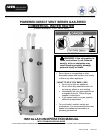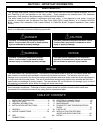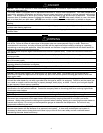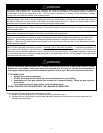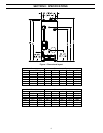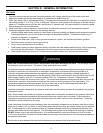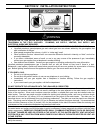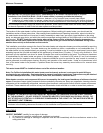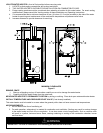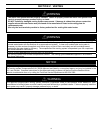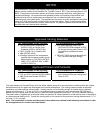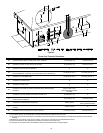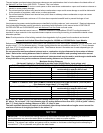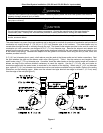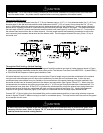
9
Minimum Clearances
The location of this water heater is of the utmost importance. Before installing this water heater, you should read the
Installation section of these instructions. After reading these Installation and Operating Instructions, select a location for
the water heater where the floor is level and is easily accessible to water lines, gas supply (type identified on the rating
plate), an adequate open drain, and within the maximum specified venting distance to an outside wall or roof for the direct
vent terminal. DO NOT locate the water heater where water lines could be subjected to freezing temperatures.
Make sure the cold water pipes are not located directly above the gas control so that condensate during humid
weather does not drip or accumulate on the controls.
This installation must allow access to the front of the water heater and adequate clearance must be provided for servicing
and operating this water heater. The water heater may be installed on either a combustible or non-combustible floor. If
the water heater is to be installed directly on carpeting, it must be installed on top of a metal or wood panel (or equivalent)
extending beyond the full width and depth of the appliance by at least three (3) inches (7.6 cm) in any direction or, if the
appliance is to be installed in an alcove or closet, the entire floor must be covered by the panel. The minimum clearances
to combustibles for this water heater are given on the following pages. A minimum of 24 inches (61 cm) front clearance
must be provided for inspection and servicing. Adequate clearances must be provided for easy access to controls by
service personnel to enable proper cleaning, servicing, and operation of the water heater. Under no circumstances is the
front of the water heater to be placed in a position where the burner tray assembly cannot slide out for removal when
servicing.
This water heater MUST be installed indoors out of the wind and weather.
Note: For California installation this water heater must be braced, anchored, or strapped to avoid falling or
moving during an earthquake. See instructions for correct installation procedures. Instructions may be obtained
from DSA Headquarters Office, 1102 Q Street, Suite 5100, Sacramento, California 95811.
Water heater corrosion and component failure can be caused by the heating and breakdown of airborne chemical
vapors. Examples of some typical compounds that are potentially corrosive are: spray can propellants, cleaning solvents,
refrigerator and air conditioning refrigerants, swimming pool chemicals, calcium and sodium chloride, waxes and process
chemicals. These materials are corrosive at very low concentration levels with little or no odor to reveal their presence.
UNPACKING
INSPECT SHIPMENT carefully for any signs of damage.
1. All equipment is carefully manufactured, inspected and packed.
2. Any claims for damage or shortage in shipment must be filed immediately with the manufacturer noted on the
rating plate label.
DAMAGE TO THE WATER HEATER CAUSED BY EXPOSURE TO CORROSIVE VAPORS IS NOT COVERED
BY THE WARRANTY. DO NOT OPERATE THE WATER HEATER IF EXPOSURE HAS OR WILL OCCUR. DO
NOT STORE ANY POTENTIALLY CORROSIVE COMPOUNDS IN THE VICINITY OF THE WATER HEATER OR
THE DIRECT VENT TERMINAL.
This water heater may be installed in an alcove on combustible flooring with clearances from combustible materials
as shown in the following clearances illustration of this Installation and Operation Instruction Manual.
NOTICE
The National Fuel Gas Code (ANSI Z233.1- latest edition) or in Canada The Natural Gas or Propane
Installation Code CAN/CGA (B149.1, B149.2- latest edition), expressly prohibits the following:
a. Installation of a water heater in a bathroom, bedroom, or any occupied room normally kept closed.
b. Installation of a water heater in a garage, unless the unit is installed so that the burner and ignition devices are
at least eighteen (18) inches (45.8 cm) above floor level and protected to avoid damage by a moving vehicle.
If the buildings cold water supply has a back-flow preventer, check valve or water meter with check valve, provisions
for thermal expansion of water in the hot water system must be provided.
CAUTION



